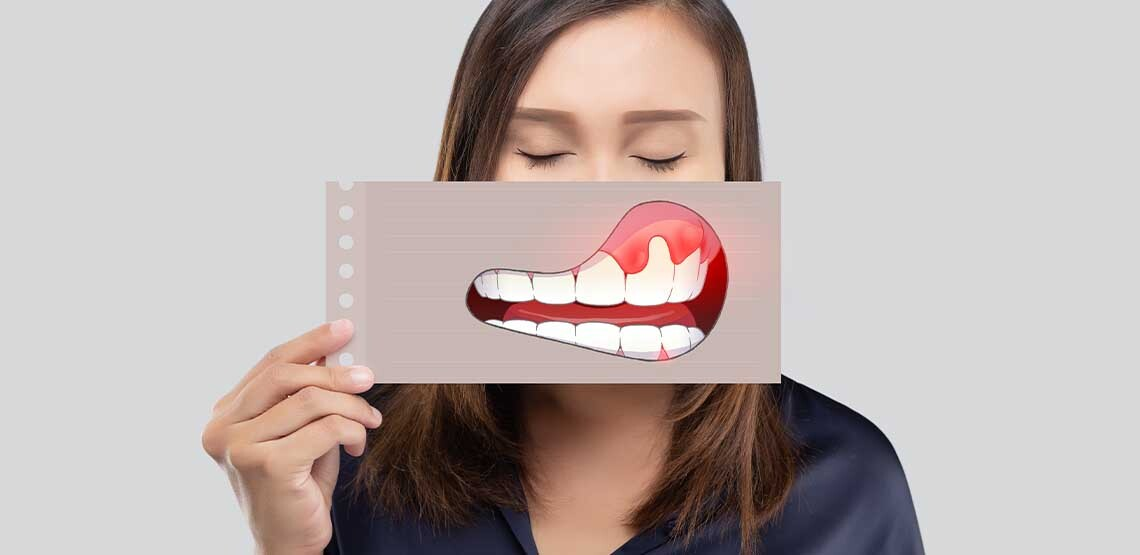How to Treat Swollen Gums
Swollen gums involve inflammation of the tissues that support your teeth. Healthy gums should be pink and flat and do not bleed when you brush your teeth. When your gums swell, it usually starts where your tooth meets the gum. As a result, the gums may protrude out and may be sensitive. If your gums are swollen, you might wonder if it is anything to be concerned about. In some cases, swollen gums may signal underlying gum disease. Continue reading below to learn more about swollen gums, including how to treat and prevent them.
Symptoms to Watch For
Symptoms of swollen gums may start mild and gradually get worse if left untreated. In other instances, swelling is severe and also causes additional symptoms. Symptoms may include:
- Dark red or purple gums
- Pain
- Bleeding when you floss or brush
- Bad breath
Causes of Swollen Gums
It is important to pay attention to swollen gums. It can be a sign of gum disease. However, there are also a few other common causes of swollen gums, such as the ones listed below.
Gingivitis
Gingivitis is one of the most common causes of swollen gums. It occurs when plaque deposits on the teeth. Over time, the plaque hardens and becomes tartar. Tarter can lead to gingivitis and swollen gums. Gingivitis requires professional dental treatment.
Pregnancy
During pregnancy, a change in hormones can cause an increase in blood flow to the gums. The increased blood may cause the gums to become irritated more easily than usual and lead to swelling. The problem usually resolves after delivery.
Stuck Food
A minor cause of swollen gums is food stuck in the teeth. It can lead to irritation and swelling in the gums. In most cases, once the food is dislodged, the swelling usually decreases.
Oral Infections
Bacteria, fungi, and viruses can lead to an oral infection. If an oral infection is not treated promptly, one of the symptoms can be swollen gums.
Related Search Topics (Ads)
Nutritional Deficiency
Although less common than other causes, certain nutritional deficiencies can also cause swollen gums. For instance, vitamin C is needed for the repair of your gums and teeth. A deficiency may lead to inflammation in the gums.
Treatment Options
In some cases, home remedies are enough to treat swollen gums. In other instances, professional dental treatment is needed. The type of treatment recommended depends on the cause and severity of the symptoms. Treatment may include the following:
Gargling with Saltwater
Saltwater can help reduce inflammation and swelling in the gums. Saltwater promotes wound healing. Consider gargling three times a day.
Oral Rinses
Your dentist can prescribe an oral rinse to decrease symptoms of gingivitis by reducing plaque and tartar.
Anti-Inflammatory Medications
Anti-inflammatory medications (such as Advil or Aspirin) may decrease pain and swelling. Although it does not treat the underlying cause of gum swelling, it can reduce discomfort and may speed healing.
Root Planing
When gum swelling is due to gum disease, professional treatment may be recommended. For example, root planing involves a procedure to remove the tartar and plaque from the roots of the teeth. Root planing is a deep cleaning treatment that is performed under a local anesthetic.
How to Prevent Swollen Gums
When it comes to swollen gums, learning ways to prevent the problem is optimal. Fortunately, there are several things you can do to decrease your risk of swollen gums, including:
See Your Dentist Regularly
One of the best ways to prevent gum swelling is to go to your dentist regularly for checkups and professional cleanings. Daily brushing and flossing are helpful to keep your gums and teeth healthy. But once tartar hardens, it can be difficult to remove by brushing alone. Professional cleaning will eliminate a buildup of tartar.
Floss Daily
Flossing removes the food between your teeth that brushing may not reach. Floss daily, but be gentle to avoid irritating the gums. According to the American Dental Association, the best way to floss is to slowly guide the floss between the teeth. Avoid snapping the floss into the gums, which can irritate the tissue. Instead, gently glide the floss in the space between the tooth and the gums to remove trapped food particles.
Brush Correctly
Brushing your teeth at least twice a day is essential to keep your gums in good shape. But it is not only the frequency of brushing that counts. It is also the technique that matters. For example, avoid brushing too hard, which can damage gum tissues and lead to swelling. Dentists usually recommend a toothbrush with nylon bristles. Use a gentle back and forth motion when brushing.
Limit Sugar
Eating foods that are high in sugar is unhealthy for your body and your teeth. Sugar promotes the buildup of bacteria in the mouth. Bacteria increase the acid in your mouth and adversely affect your teeth and gums. Limit sugary drinks, ice cream, and other sweets.

